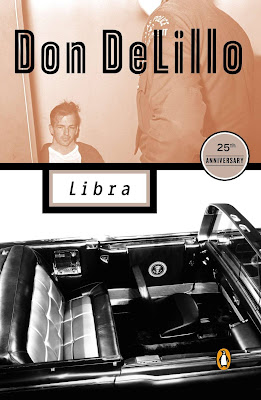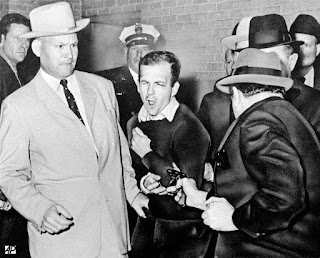This is not
a book review, contrary to its appearance and what you may have been
expecting. I will explain shortly why I cannot review Libra
by Don DeLillo, and I will give you links to bonafide reviews of the
novel by two people vastly better versed in DeLillo and skilled in
reviewing any
literature than I. And I would advise reading them before embarking
on the book itself. Fair warning.
What I hope
to do here is to help those who have yet to read Libra, to prepare them
for the invasion of voices. For as you read along you will find these
voices, so real and so familiar and yet so alien, camped in your
head mingling with your
voices, yours and their multiple voices, each struggling for
dominance, theirs insinuating with such uncomfortable intimacy you
will begin to squirm, worrying, wondering how come they are hanging
around and how long do they plan to stay. For me thus far they
continue to haunt, especially at night, several days after I’ve
read the book. The most persistent are the single voice of Nicholas
Branch and several belonging to the man we know as Lee Harvey Oswald,
the name which, oddly, Oswald had used so seldom he barely recognized
it when he and the world heard it interminably mouthed and broadcast
soon after those seven November seconds in Dallas that changed
everything.
Branch, for
me the most psychologically accessible character in the novel,
appears infrequently in a CIA-provided office addition to his house,
where he labors alone sifting through literally tons of material and
writing the secret official history of the assassination for the
Agency. His reflections are ours in confronting a mystery, which,
despite every available tendril of even remotely plausible evidence
and state-of-art analysis, remained as distant then—Libra
was published in 1988--as it does today and most likely ever shall.
His voice is a touchstone,
reminding us that while what we are reading is fiction the story’s
roots are not, and that those earlier voices are the ones making the
mystery that seems to unravel itself now, but only in the
imagination. It is there the voices haunt. Not so much with what they
say, but with the atmosphere, the bleakness from what we know is
coming, that covers every thought and word and movement of these
tragic ghosts that can never rest. They spoke to DeLillo, and he
brings them to us.
“I
thought I would be haunted by this story and these characters for
some time to come,” he tells us in an interview,
“and that turned out to be true. Libra
will have a lingering effect on me partly because I became so deeply
involved in the story and partly because the story doesn’t have an
end out here in the world beyond the book—new theories, new
suspects and new documents keep turning up. It will never end. And
there’s no reason it should end. At the time of the twenty-fifth
anniversary one newspaper titled its story about the assassination
‘The Day America Went Crazy.’ About the same time I became aware
of three rock groups—or maybe two rock groups and a folk
group—touring at the same time:
the Oswalds, the Jack Rubies, and the Dead Kennedys.”
Libra summoned dark
nuances from my interior archive and added mummified flesh to the
bones of shock I’d begun stashing away starting with the visual of
an Air Force officer running toward us in Philadelphia where we’d
deplaned temporarily to allow refueling on our passage from basic
training at Fort Leonard Wood, Mo. to Fort Devens, Mass. for
specialty schooling. I don’t remember which voice broke the news,
the officer’s or one of ours, that JFK had been shot. And this was
all anyone knew until our flight ended at Worcester, Mass. and the
bus conveying us to Devens stopped in a Boston suburb in response to
the first experience I’ve ever had with a newsboy on a street
corner shouting, “Extra!!” He came aboard, and we bought all of
his papers. The headline screamed that our president was dead. After
three or four paragraphs, containing little more than this, the story
went on, backgrounding Kennedy’s visit and noting what was planned
for him the following day. Most if not all of those collector’s
editions remained on the floor when less than an hour later we
zombied off the bus at our new duty station. I fell ill almost
immediately, and was still sweating away a fever in a barracks bunk
when someone announced that Oswald had just been shot. I remember
weeping on and off, but, characteristically for me, not for the
significance of what had happened, but from the mournfully comic
Peter, Paul and Mary tune, popular then, which triggers bathos in me
to this day whenever the wailing strains of Stewball chance to
reach my aging ears.
Were I to hear that damned
song right now, a long untapped well of salty hysteria just might spew forth and short out my laptop’s circuitry, bringing this
shifty effort to chase old ghosts back into the deep night to a
ZAPPP...ing
halt.
On the positive side, while
the DeLillo novel, thought at the time to be his darkest and most
complex, flushed out one of the darkest corners of my psyche’s
hidden vault, perhaps Libra helped me get a
handle with reasonable clarity on what I’d truly never wanted to be
so starkly reminded of again.
And in doing so it also
enabled me to banish what I now see was an inexcusably irrational
refusal to read anything by this master of story, sentence,
character, dialogue, and frightening insight. I won’t even try to
go there, other than to suggest now, tongue half in cheek, that maybe
some metaphysical caution was in play keeping my sensibility
pristine, safe from this wizard of thunderous letters, until I was
ready. My father’s flight instructor, after the usual series of
takeoffs and landings in the little Piper Cub he eventually credited
with saving his sanity, stepped out and onto the ground. “She’s
yours, Lloyd,” my dad said Luke Altschwager told him, “Take her
up.” He soloed then, my dad, thank the heavens, saving his family’s
sanity as well. My thanks to Fictionaut’s Chris Okum for somehow
managing to persuade me to face my own uncertainty and take this leap
out of my DeLillo denial zone.
 |
| DeLillo |
At the start here I promised
you links to a what a couple of professional wordsmiths had to say about this, for me,
life-changing masterpiece. Here’s Anne Tyler’s marvelous review
in The
New York Times. And this essay, written more recently by
Troy Jollimore for the National Book Critics Circle, should accompany
assigned reading of Libra
in any college lit course.
And here...oh, what the hell:
Stewball




I haven't read anything by this author. The book sounds interesting but I am not sure what feelings it might dredge up in me. And it is long. But now that you have made me aware of it, I am more likely to give a try someday.
ReplyDeleteI didn't even know about Libra until recently, Tracy, but I knew about DeLillo, and had decided long ago I would not read him at all. I often react that immature way when something new comes out and is ballyhooed hither and yon. I'm glad, tho, that Chris Okum finally persuaded me to give him a try. Sure glad I did!
Delete